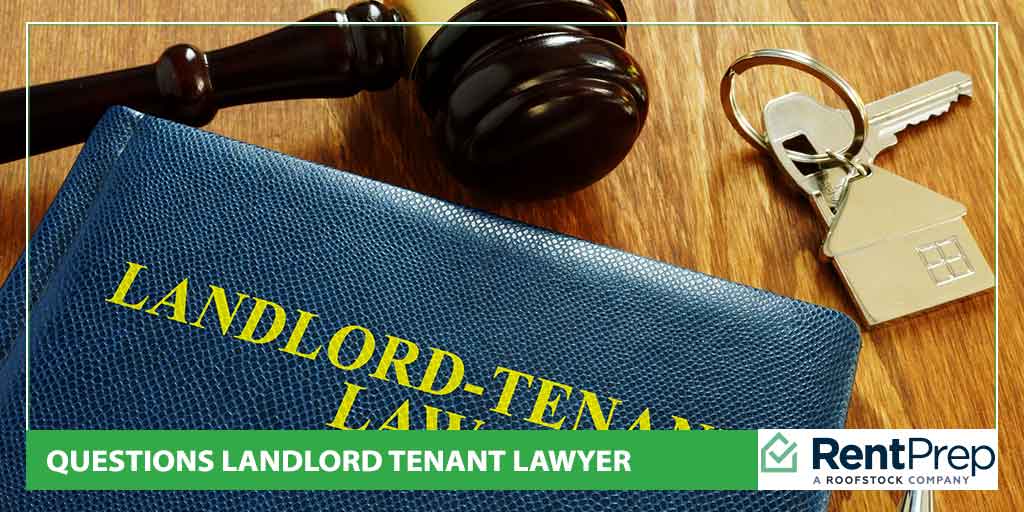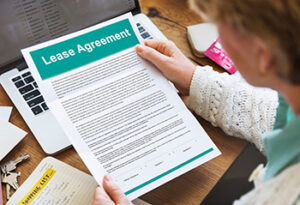
Navigating the maze of landlord-tenant law can be a perplexing journey. Landlords often find themselves grappling with similar legal quandaries and frequently turn to landlord-tenant lawyers armed with a barrage of questions.
Although each situation is inherently unique, we understand the need for insights that can serve as a compass in the complex legal terrain.
The information below is meant to provide a foundational understanding, not as legal advice. Consider these answers to some of the most common landlord legal questions as a starting point on your journey. When the path ahead becomes intricate, always seek the counsel of a specialized rental lawyer for guidance.
Table Of Contents: Landlord Legal Questions
What are some of the most common questions that landlords have for landlord-tenant lawyers? Find out below.
- 1 – What Is A Lease Or Rental Agreement, And Why Is It Important?
- 2 – Do You Need A Rental Applicant’s Consent To Obtain Their Credit Report?
- 3 – Can I Refuse A Prospective Tenant Because They Have Children?
- 4 – How Much Can I Charge A Tenant For A Security Deposit?
- 5 – Do I Need To Tell My Mortgage Lender I Am Renting The Property?
- 6 – When Can A Landlord Enter A Rental Property?
- 7 – Can Tenants Withhold Rent Because The Landlord Has Failed To Make Repairs?
- 8 – Can Landlords Evict Tenants Whenever They Want?
- 9 – Can A Judge Require A Landlord To Enter Into A Payment Agreement With A Tenant?
- 10 – Can Tenants Make Repairs To Rental Properties On Their Own?
- When To Consult A Landlord-Tenant Lawyer
1 – What Is A Lease Or Rental Agreement, And Why Is It Important?
 The lease or rental agreement is the legal contract between the landlord and the tenant that establishes the rights and obligations of each party. A lease agreement should always be in place when a landlord rents to a tenant in order to protect both parties.
The lease or rental agreement is the legal contract between the landlord and the tenant that establishes the rights and obligations of each party. A lease agreement should always be in place when a landlord rents to a tenant in order to protect both parties.
The agreement should establish the ownership of the property and the terms and conditions under which the tenant can use the property, including dates (for example, a one-year lease or a rolling month-to-month lease), the amount of rent to be paid, security deposits, and so on.
It should also specify the landlord’s responsibility to respect the tenant’s privacy and maintain a safe and liveable property, as well as the responsibility of the tenant to maintain and care for the property.
The lease agreement should clarify what will happen if either party breaks the terms of the legal contract and how and under what circumstances the contract can be terminated early. The agreement must also be in compliance with local rental laws.
2 – Do You Need A Rental Applicant’s Consent To Obtain Their Credit Report?
Laws differ from state to state, and New York has some of the most stringent laws in the country. In New York City, you must get permission from a rental applicant before running their credit history. Also, you can only charge a maximum fee of $20 to cover the expense of the tenant screening process, and if it costs less, you should charge the actual fee.
Even if you are renting in a state where written permission is not explicitly required, it is recommended that you request written permission as part of the application process to ensure you are fully covered.
3 – Can I Refuse A Prospective Tenant Because They Have Children?
No, you cannot refuse prospective tenants on the basis of having dependent children as long as they still comply with the property’s reasonable occupancy limit. It is also not legal to place unreasonably low occupancy limits on properties in order to discourage families.
Under discrimination laws, you cannot refuse prospective tenants on the basis of any protected characteristics including race, color, religion, family status, age, or disability. Many states also have explicit laws preventing discrimination on the basis of sexual orientation or gender identity.
4 – How Much Can I Charge A Tenant For A Security Deposit?
 Security deposits are a standard part of any tenancy agreement to cover the landlord for potential damage to the property or if the tenant decides to leave without paying their rent in full.
Security deposits are a standard part of any tenancy agreement to cover the landlord for potential damage to the property or if the tenant decides to leave without paying their rent in full.
However, a security deposit should not be considered a “charge.” Instead, it’s a deposit held securely as part of the lease agreement but available to be returned to the tenant or assumed by the landlord, depending on conditions at the end of the lease.
While it is common for a security deposit to be the equivalent of one month’s rent, legal maximums vary. For example, the affordable housing limit for security deposits is 1.5 times the monthly rent under the Security Deposit Act. For other types of housing, there are local laws. For example, the security deposit limit is the equivalent of one month’s rent in New York and two to three months in California, depending on whether the property is furnished.
In addition to the security deposit, you can also ask for the last month’s rent. While this does not count toward the security deposit limit, this should likewise be held as a deposit rather than a charge.
5 – Do I Need To Tell My Mortgage Lender I’m Renting The Property?
Unless you have a buy-to-let mortgage specifying your intention to rent the property, you must let your mortgage lender know you’re renting your property.
When you purchase a home as your primary residence and not as an investment property, you tend to receive beneficial loan terms and rates, but lenders also typically include owner occupancy rules. So, if you don’t advise your lender you’re using the home as a rental, you’re technically committing fraud and breaching the contract.
As long as you’ve met the minimum occupancy period for your home as specified in your mortgage agreement, which is often one year, your lender may allow you to rent out the home without any penalties or changes in fees.
However, you will need to update your homeowner’s insurance policy to ensure you are properly covered for landlord-related liabilities.
6 – When Can A Landlord Enter A Rental Property?
As part of a rental agreement, the tenant gains the right to use the property, meaning the landlord cannot enter without giving proper notice. But the landlord can enter without explicit permission as long as proper notice has been served.
The required notice period depends on local laws. For example, it’s 24 hours in California.
A longer 48-hour notice period is required in certain circumstances, such as when scheduling a move-out inspection or showing an occupied property to a potential new tenant.
Tenant privacy extends to all parts of the property included in the lease agreement. For example, a landlord could not enter a backyard without proper notice if the yard is included in the lease.
Exceptions are made in cases of emergency, which allow the landlord to enter the property without advance notice or permission. Examples of qualifying emergencies include fire, flooding, and gas leaks. To make the action legal, the need for immediate access must outweigh the tenant’s right to privacy.
7 – Can Tenants Withhold Rent Because The Landlord Has Failed To Make Repairs?
If a landlord refuses or is unreasonably slow to make necessary repairs, the tenant is legally entitled to withhold rent payments until the repairs are made. This can be done because the landlord is not meeting their obligation to provide a habitable living space for the tenant.
While some states allow tenants to simply stop paying rent, others require tenants to pay the rent to the court or into an escrow account. However, the property must be classed as “unlivable” for it to be legal to withhold rent, and tenants cannot withhold payment if they are already behind on the rent or committing any other major lease violation.
If a landlord can show that tenants are unjustified in their decision to withhold rent, they are within their rights to pursue eviction for nonpayment.
8 – Can Landlords Evict Tenants Whenever They Want?
Landlords cannot evict tenants without reason, as the lease agreement has granted the tenant the legal right to use the property for a designated period of time. Only when the lease ends is the landlord free to choose not to renew it. A landlord needs a legally sound reason to evict a tenant while a rental agreement is in force.
There are a variety of justifiable reasons for evicting a tenant mid-lease. These include nonpayment or incomplete payment of the rent as agreed in the lease, illegal activity on the property, domestic violence, actively damaging the property, unauthorized pets, and any other violation of the lease terms.
Under these circumstances, the landlord must serve the tenant with written notice describing the situation. This notice should specify what the tenant can do and by when (for example, pay all outstanding rent by the end of the month) to continue living in the property or specify a date by which the tenant must move out that is in line with local laws. This is often between seven and 30 days.
If the tenant does not comply with this notice, the landlord is then free to file for eviction.
9 – Can A Judge Require A Landlord To Enter Into A Payment Agreement With A Tenant?
No, a judge cannot order a landlord to enter into a payment agreement, and the landlord is within their legal rights to require payment in full or pursue eviction.
However, a landlord can choose to enter into a payment arrangement with a tenant, which should be established in writing.
In New York, rent is considered late if it’s unpaid on the day past due. The landlord should then wait five days to officially notify the tenant in writing that the rent is overdue and the potential consequences. Once the rent is 14 days past due, the landlord is free to pursue the eviction process.
In New York, a landlord can start charging late fees after the statewide five-day grace period. The maximum late fee is $50 or 5% of the rent, whichever is lower.
10 – Can Tenants Make Repairs To Rental Properties On Their Own?
Landlords can choose to let tenants make repairs to their own rental properties, and some states allow tenants to deduct the cost of repairs from their rent as long as the work is not purely cosmetic or due to damage caused by the tenant.
However, landlords are also free not to allow that sort of work. They are advised to restrict what tenants can do themselves because if the work is done improperly, it can create a dangerous living environment, increase the landlord’s risk liability, and cost you more down the line to fix the problem.
When To Consult A Landlord-Tenant Lawyer
The laws governing rental properties and relationships between landlords and tenants vary from state to state and are updated frequently. It can be hard for landlords to keep on top of new laws and know how to deal with situations that have never arisen before. If you are in doubt about what to do or are dealing with a situation not clearly covered in your lease agreement or state laws, landlord-tenant lawyers are there to help.
A good lawyer can help you protect yourself against protracted and costly legal battles, which may also see your property not earning any income while you resolve the situation. Also, remember that legal fees are part of the cost of doing business and are tax deductible.
Note: RentPrep does not provide tax, legal or accounting advice. This material has been prepared for informational purposes only, and is not intended to provide, and should not be relied on for, tax, legal or accounting advice. You should consult your own tax, legal, or accounting advisors.

